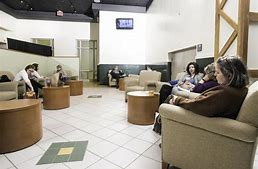SHREWSBURY, Mass. Pamela Wykoff hates hospitals but that’s okay, because as a professor of English at Colburn College here she doesn’t have to get near one for her job. “I hate how they put you in those ‘johnny’ things that never cover your derriere,” she says demurely. “I’d rather study cross-cultural trends in virgules”–her favorite punctuation mark, which most people refer to as a backslash–“with a nice cup of chamomile tea.”

“I think that I will never see/something as gross as a colonoscopy.”
But Wykoff, who also edits “Punc,” the only literary journal devoted exclusively to punctuation, has overcome her repulsion at the smell of healthcare to embark upon an exciting joint venture with Dr. Morton Shusterman, a gastroenterologist at the medical school here. “Pam’s quite a gal,” says Shusterman in lingo that might offend his female partner if she weren’t doubling her regular salary by entering the highly-paid medical profession. “She’d make a great G.I. if only she’d keep her nose out of poetry books.”
The project that has Wykoff and Shusterman working together is a medical innovation called a “semicolonoscopy,” which they hope will be a less stressful technique than a colonoscopy. Doctors such as Shusterman recommend a colonoscopy once every five years for those with polyps, but patients avoid them as a measure worse than the ailment they are designed to prevent. It is the unlikely team’s goal to get patients to want to go in to have their colons examined, thus reducing their risk of cancer.

“Remember to close the parentheses before you sew them back up.”
“You start with the awful ‘prep’ drink,” Wykoff says with an involuntary shake of her head, referring to the vile magnesium citrate mix that looks like anti-freeze but tastes worse. “We cut it with Gatorade and a little chardonnay and make a wine cooler out of it.”
Then there are the boilerplate forms that are mandatory, making a mockery of the voluntary consent they purport to express. “Pam did a good job making them less intimidating,” Shusterman says. “She threw in a couple of Sylvia Plath poems about how much she hates her dad that make the rest of the text pleasant by comparison.”
Finally there is the procedure itself, which few patients remember because it is performed while they are under anesthesia, but which no one likes to contemplate because of its intrusive nature and location. “I rewrote the pamphlet using a term from Yeats’ poem ‘Crazy Jane Talks With the Bishop,’” Wykoff says proudly. “Now we say it involves the place where Love pitched his mansion.”

